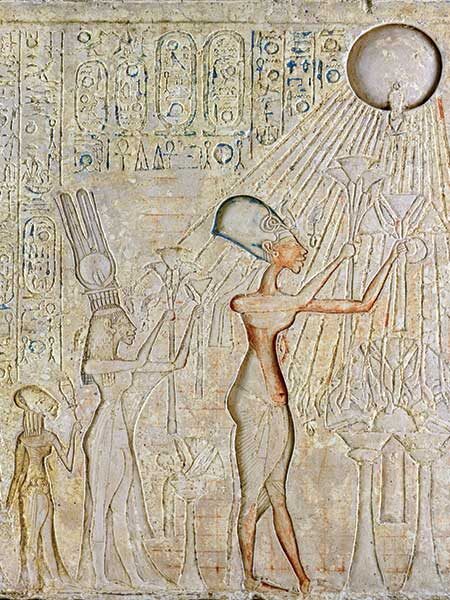Akhenaten
Mesopotamia, Pharaohs, Moses
Knowing God began long before Moses and Abraham. Our first ideas of the divine arose in the Mesopotamian city‑states along the Tigris and Euphrates, where sky, river, and crop were deified. Temples rose to Anu, Enlil, and Inanna, yet none grasped the single light that had been guiding human consciousness since its birth. The Christ‑light moved silently beneath every ziggurat and altar, waiting for minds to awaken beyond fear and famine.
Egypt advanced the pattern of polytheistic living with a theocratic society. Pharaohs claimed divinity, and more than two thousand gods filled the pantheon. Entire cities pledged themselves to one deity, practicing henotheism long before monotheism had a name. In that swirl of gold and ritual, young Moses floated on the Nile, rescued into royal privilege and steeped in polytheistic lore. His life reminds us that God’s call often begins in the heart of illusion.
Centuries before Moses, Pharaoh Akhenaten glimpsed something singular. He exalted Aten—the sun disk—as the one god and tried to reorder Egypt around that idea. His vision faltered under political weight, yet it foreshadowed a truth: the Soul is restless until it knows God.

Every human being has the chance to go beyond this world to God. Our depth is deciding that journey.
We’re making money a second God and shaping lower mind ideas by it.
When God spoke from the burning bush, Moses stepped from a polytheistic idea of many gods to the One God. That moment was less a theological shift than a leap of consciousness. He discovered that the Creator of stars also speaks within the silence of an exiled shepherd. From Mesopotamian myths to Egyptian pantheons, humanity had been circling the same mountain; the bush simply caught fire to show the path upward.
History reveals a pattern: we search for God through systems, then God breaks the system to meet the individual. Christ’s light has always preceded religion, and it will always carry the door to God. Whether under Babylonian sky, Egyptian sun, or desert flame, the lesson endures: God moves first, we awaken second. Our task is not to protect old temples, but to follow the light that outshines them.
Buddha carried enlightenment drawn from Christ‑light, walking toward God without knowing the name. He lived roughly eight hundred years before Moses, yet the same light guided his awakening. Enlightenment does not originate in ritual; it is the gift of God moving silently within every era. The more we live for mainstream concepts, the further from God we go. We won’t build muscle for God as long as we build muscle for matters level and its ideologies.
His life confirms that divine light precedes belief. We may not recognize God, but His illumination remains the source of every genuine insight. Whether cloaked in royal silk or desert wool, the Soul awakens when inner light outweighs outer comfort. That awakening is always God’s work—quiet, persistent, and universal.
Our knowing God was made to be a religious endeavor, when it has always been the birth cycle of human life. The individual is living to know God regardless of their beliefs, ideologies, and ideas of reality. The mind is a temporal storyteller while the Soul is our light in God.
Knowing God
Only the individual can know God. He doesn’t walk in a group idealogy because, by creation, only one level of consciousness is knowing the world. There’s only one of us here with God, carving depth. The path is by the Soul’s light, ready to know Him. No religion can pave the walk with God. The world already has our personal curriculum with Him.
The Pharaoh Akhenaten lived during a period when polytheistic ideas were prevalent. He faced down the Amun priesthood, traditional cults in Egypt, and a nation long nurtured on a pantheon of gods numbering by the thousands. Ahkenaten’s idiosyncratic idea of God is what every human being lives by.
Siddhartha Gautama walked his path, and Akhenaten his. Muhammed walked his light towards the Angel giving revelations. No one can determine another human being’s walk to God. It is solely between God and them. Nothing in this world breaks bread with God until He chooses it.
Empires and rulers have made religion everything they are today. Nationalism is aligned with periods of war. In the Byzantine and Persian Empires, a ruler wanted to be seen as a god. A theocratic way of living for rulers was normal. Even back when Buddha was living, kingdoms held court with Brahmans.
We have always depended on satan for power and control, or to feel holy.
Beyond this world is our anchor, and without a deeper calling, our depth will not depart the shores of satan. The mind won’t build bridges; it can’t determine the outcome with, and yet that is the hidden door to everything in life. The silent partner carries us and never walks alone.
